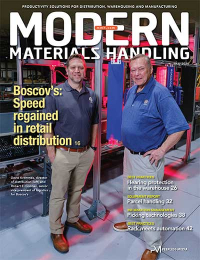Nebraska Senator Fischer rolls out bill focused on funding U.S. infrastructure
Latest Material Handling News
Earlier this month, U.S. Senator Deb Fischer (R-Neb) unveiled proposed legislation focused on funding and building new infrastructure projects in the United States.
Entitled the “Build USA Infrastructure Act,” Fischer, who also serves as chairman of the Senate Committee on Surface Transportation, noted that this bill would address future infrastructure funding shortfalls and provide states with greater flexibility to navigate regulatory burdens that have long delayed critical projects.
“Funding challenges and the burdensome federal regulatory approval process have delayed infrastructure projects across America for decades. It’s time for a new approach. Today, I’m proud to put forward this legislation, which is modeled after proven successes in accelerating major transportation projects throughout Nebraska. The Build USA Infrastructure Act is a responsible, forward-looking proposal to strengthen roads, bridges, and highways for the benefit of the American families and workers who use them every day,” said Fischer.
As for how this legislation would provide the needed capital for U.S. infrastructure projects, Fischer explained it would divert $21.4 billion on collected revenues on freight and passengers from the U.S. Customs and Border Patrol for five years upon the expiration of the Fixing America’s Surface Transportation Act (FAST Act) at the end of 2020. This money would go towards the Highway Trust Fund. The HTF is critical as its revenues are allocated for federal highway, transit, and highway safety programs. But the main funding source for the HTF, the federal gasoline tax, has not increased from its current levels of 23.4 cents for diesel and 18.4 cents per gallon of gasoline since October 1993. What’s more, diesel taxes represent about 90 percent of Highway Trust Fund (HTF) net revenues.
And in March 2016 the Congressional Budget Office issued projections stating that the HTF will face a shortfall of roughly $107 billion by 2026.
Other key facets of the legislation include:
- a state may enter into a State Admittance agreement with the Federal Highway Administration for 3 years or longer;
- during this period the state agrees to remit to the Administration no less than 60 percent of the total amount of funds received by the state from the federal government during each year of the agreement for Federal-aid highway activities;
- the Administration agrees to provide the state with funds in an amount equal to 90 percent of the amount the state remitted to the Administration;
- the state agrees to use the funds received from the Administration to carry out core infrastructure projects; and
- the Administration shall deposit an amount equal to 10 percent of the funds remitted to the Administration by states to the Highway Trust Fund
This legislation comes at a time when large scale infrastructure funding plans are gaining traction on both sides of the aisle with President Trump talking about it often on the campaign trail and industry reports indicating a formal plan, which could include up to $1 trillion in funding over ten years, could be dropped this spring.
One of the things Trump made clear in his acceptance speech after election night was that a national commitment to infrastructure could no longer be ignored or overlooked. “We are going to fix our inner cities and rebuild our highways, bridges, tunnels, airports, schools, hospitals,” he said. “We’re going to rebuild our infrastructure, which will become, by the way, second to none. And we will put millions of our people to work as we rebuild it.” And his inauguration speech included similar comments.
And Senate Democrats also introduced a $1 trillion plan of their own recently, which is expected to create 15 million jobs, with $210 billion allocated towards repairing aging roads and bridges and $200 billion for “a vital infrastructure plan” to finance transportation projects of national significance” according to reports.
Regardless of how things play out legislation-wise, getting the funding done correctly firmly remains at the top of the to-do list, which does not come as a surprise, given the well-documented funding shortfalls, especially in recent years.
In a recent interview, Katie Thomson head of the Transportation Industry Group at Washington, D.C.-based law firm Morrison and Foerster, and former general counsel at the U.S. Department of Transportation and chief counsel at the Federal Aviation Administration, explained that what the U.S. transportation system needs is a long-term funding solution that meets the needs of the country as a whole.
“It cannot be a one-off, one-time injection of a lot of money for certain big projects in limited parts of the country,” she said. “An initial infusion for that could be good, but it needs to be a long-term, comprehensive, [multi]modal fix. And I am very concerned that is not going to be where the focus of the administration is. They are going to want to get some quick wins and call it a success. I do not view that as meaningful investment that this country so desperately needs to drive the economy and ensure that people and goods can get where they need to be in a safe and efficient way.”

Article Topics
News & Resources
Latest in Materials Handling
Lift Trucks & Accesories: The Trusted Workhorse Evolves Automate & Accelerate: Replacing Pick-to-Light with the Next Generation of Automation 6 Ways to Re-evalute Fulfillment This Year MHEFI awards record-breaking $231,700 in scholarships to 61 students ALAN opens nominations for 2024 Humanitarian Logistics Awards Kenco to install an AutoStore system at its Jeffersonville, Ind., DC Schneider Electric rolling out WMS and TMS solutions from Manhattan Associates at scale More Materials HandlingAbout the Author
Subscribe to Materials Handling Magazine

Find out what the world's most innovative companies are doing to improve productivity in their plants and distribution centers.
Start your FREE subscription today.
May 2024 Modern Materials Handling

Latest Resources










